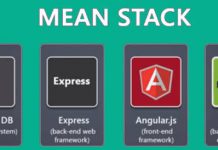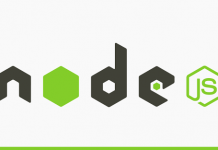The MERN stack is a popular open-source software stack that is used to build web applications. MERN stands for MongoDB, Express.js, React.js, and Node.js. Each of these technologies provides a unique set of features and benefits that make the MERN stack one of the most powerful and flexible development platforms available today.
In this article, we will take a closer look at each of the components of the MERN stack and discuss how they work together to create modern, scalable web applications.
MongoDB:
MongoDB is a document-oriented NoSQL database that provides a flexible data model that allows developers to store and access data in a more natural way. MongoDB stores data in JSON-like documents, which makes it easy to store complex data structures. With MongoDB, developers can store and retrieve data quickly, making it an ideal database for web applications that require high performance and scalability.
Express.js:
Express.js is a fast, lightweight, and flexible web application framework for Node.js. It provides a set of powerful features for building web applications, such as routing, middleware, and template engines. Express.js allows developers to build web applications quickly and easily, making it an excellent choice for building complex applications that require a robust backend.
React.js:
React.js is a JavaScript library for building user interfaces. It provides a set of powerful features that make it easy to build complex, interactive user interfaces. React.js is particularly well-suited for building single-page applications (SPAs), which are web applications that dynamically update the content on the page without requiring a full page reload. React.js makes it easy to build reusable components, which can be shared between different parts of an application, making it an ideal choice for building large-scale applications.
Node.js
Node.js is a powerful, server-side JavaScript platform that allows developers to build fast, scalable network applications. It provides a set of powerful features for building web applications, such as event-driven programming, non-blocking I/O, and a rich set of APIs for building network applications. Node.js is particularly well-suited for building web applications that require real-time communication, such as chat applications or multiplayer games.
How the MERN stack works The MERN stack combines MongoDB, Express.js, React.js, and Node.js to provide a complete development platform for building web applications. MongoDB provides a flexible and scalable data storage solution, while Express.js provides a robust backend framework for building RESTful APIs. React.js provides a powerful frontend library for building dynamic user interfaces, while Node.js provides a scalable and fast server-side platform for running network applications.
When building a web application using the MERN stack, the first step is to design the data model and create the database schema in MongoDB. Once the database schema is defined, the next step is to create the backend API using Express.js. The API should define the endpoints that the frontend will use to communicate with the backend. Express.js makes it easy to create RESTful APIs, which can be consumed by any client application, including web browsers, mobile devices, and desktop applications.
The frontend of the web application is built using React.js. React.js provides a set of powerful features for building dynamic user interfaces, including reusable components, virtual DOM, and state management. React.js makes it easy to create complex user interfaces that can be updated in real-time without requiring a full page reload. React.js also provides a powerful toolset for debugging and testing, making it easy to build high-quality applications.
Finally, the web application is deployed using Node.js. Node.js provides a powerful platform for running network applications, including web servers. Node.js makes it easy to deploy web applications to cloud platforms like AWS, Azure, and Google Cloud. Node.js also provides a rich set of APIs for building real-time applications, such as WebSocket servers and event-driven systems.
Advantage of MERN Stack:
The MERN stack provides a number of advantages for web application development, including:
- Speed: The MERN stack allows developers to build web applications quickly and easily. With a complete set of tools for both the frontend and backend, developers can build applications much faster than with other development stacks.
- Flexibility: The MERN stack provides a flexible development platform that can be used to build a wide range of web applications, from simple single-page apps to complex enterprise-level applications.
- Scalability: The MERN stack is designed to be highly scalable, making it an ideal choice for applications that need to handle large amounts of data or high levels of traffic.
- Reusability: With React.js, developers can create reusable components that can be shared across multiple parts of an application. This helps to reduce development time and improve code quality.
- Community support: The MERN stack has a large and active community of developers, which provides access to a wealth of resources, including documentation, tutorials, and open-source code libraries.
- Cross-platform: The MERN stack is designed to be cross-platform, meaning that it can be used to build web applications for a wide range of devices, including desktops, mobile devices, and IoT devices.
- Cost-effective: The MERN stack is open-source, which means that developers can use it for free. This can help to reduce the cost of web application development, especially for startups and small businesses.
- Real-time updates: With Node.js and React.js, the MERN stack makes it easy to build web applications that provide real-time updates to users. This can help to improve user engagement and make applications more interactive.
- Security: With Express.js, the MERN stack provides a secure backend framework that can be used to build web applications that are resistant to common security threats, such as cross-site scripting (XSS) and SQL injection attacks.
- Easy to learn: The MERN stack is relatively easy to learn, especially for developers who are already familiar with JavaScript. This can help to reduce the learning curve for new developers and make it easier to onboard new team members.
Master Your Coding Skills with BootSelf AI
If you're looking to enhance your coding abilities and upskill in artificial intelligence, look no further than the BootSelf AI app. This innovative platform provides AI-based coding lessons that are tailored to your individual learning pace.
Available on both iOS and Android, you can download the BootSelf AI app and start mastering coding skills today:









